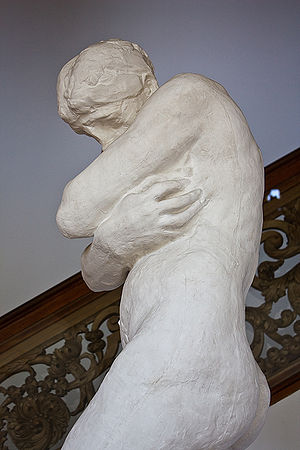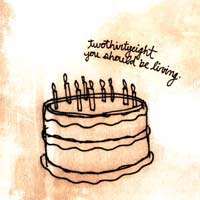Hank had to sing an Italian song for his tests.
His music instructor did not believe that he had been practicing two hours a day. When Hank asked his voice teacher to sign off on those hours, his voice teacher still did not believe him. He had nothing to feel shame about. “Then why did I?” Hank wondered. Card in his hand, signed off, Hank resentfully kicked at the rocks covering the path back to administration.
Looking out over mostly empty hard wooden seating in the music hall, Hank slaughtered the song. Even so, it was still the best performance he had ever done. His father was there in his stained tie and largeness. His mother in her too many colors, smiled loudly. She was tone deaf. Frank’s shame followed him. He had practiced.
Hank’s older brother dressed in silk shirts, a big gold medallion, a tuft of hair coming out of his barely suppressed neckline. When they prayed, Hank heard these smacking noises, and thought, “Pray for my nausea,” hoping they would stop kissing. His brother always had a girlfriend. The girlfriend was at his recital. There were noises.
Everyone was scared Hank’s brother would marry too early and maybe marry for the wrong reasons. His dad was always like, “Wait, wait!” But with Angie, Dad was like, “Get married now!” Angie was the best in a long line of noisy kissers.
They asked Hank to sing at their wedding. They insisted. His brother, his brother’s girlfriend, his parents – they spoke in harmonics all at once. “Hank! You sing like Sinatra! Don’t worry so much! You should sing!”
In a rented tuxedo, Hank sang. The mike didn’t work. Aunt Augusta told him to sing louder. Aunt Augusta didn’t hear well, even if there was a mike. Hank forgot his words and had to start over. Sweat filled his shirt and he thought about the dry cleaning.
Hank has never had a girlfriend and he is almost twenty-five. Standing in front of all those people without the song lyrics, the only words that came to him were, “I am like a sweaty doorknob.” His brother, facing a battle of his own between his ruffled shirt and his manliness, did not help. Hank thought, “He is probably waiting for prayer so he can start kissing.”
The second year of college, Hank got caught with pornography. “Hank!” His mother pulled his ear, towing him while she shook the fisted magazine through the house. He didn’t listen to her words. He only listened to his memories asking his music instructor for his signature. Was it as bad as the wedding? Talking to Sarah or walking across the campus greens were bad. He fingered his worries like a beaded necklace. He worried a lot. Worry and shame. He wished he could have a girlfriend but thought that was a hopeless cause. Hank was already planning on buying a new magazine before Mom had thrown that one in the garbage.
It is so easy to explain away why Hank is the way he is. We have heard enough to say, his parents, his brother, his isolation, his treatment from teachers. We can use these to say, “Who wouldn’t be anxious, worried, down, and isolated, when going through these experiences?” If we did though, we might miss the generalized anxiety disorder, the medical. Conceptualizing the medical in this way can be so difficult. We could call it, “the un-reasons why” we feel and do what we do. So then we don’t have to deny it. The un-reasons why don’t have to make sense. They are un-reasons, after all. We don’t have to deny them by our inherent need to point at the cause and effect, or explain into uselessness the reason we are this way. We don’t have avoid eye contact just because they can’t be seen.
Hank, like so many of us, is included in the statistics that generalized anxiety disorder, or GAD, is one of the top reasons why we don’t get intimate with others. The anxiety is distracting. It isolates us. It preoccupies our thoughts. It fills us with self-doubt and develops over time, almost inevitably if not treated, into depression.
Getting by with something as subtle as GAD, or other brain illnesses such as degrees of depression, have potentially devastating effects on what occupies our life-line. The moments that construct the overall devastation may be explained away by one injustice or another, by what are thought to be personality quirks, or simply by neglect of self. But they could be different. The moments, the otherwise same moments, could be different. The same rude, distrustful teacher, the rejection from Sarah, the quiet mike – those moments could have been different with the same guy, different only in his brain health. Brain health makes the sameness different.
As Nancy A. Payne, of New York University (NYU) Silver School of Social Work, wrote about treating brain illness,
“There is tremendous satisfaction gained from facilitating the transition from profound illness to equally profound recovery.”
The life-line takes courage to look at. It takes courage to believe that the effect of our negative thoughts and distorted perceptions could indeed have that pervasively profound effect. It takes courage to consider that medical treatment can likewise, profoundly change our quality of life.
Hank tried to take his life with a rope before we met. I’m so glad he didn’t break his neck or die. He is now well treated and his disease is in remission. His life-line has changed.
Questions: What are you brave with? What do you spend your courage on? Tell us about it. We gain so much from community and connection. Keep on.
Self-Care Tip: Look also at the un-reasons, at the reasons less apparent, at what isn’t seen – look into those reasons of why we feel and do.




















